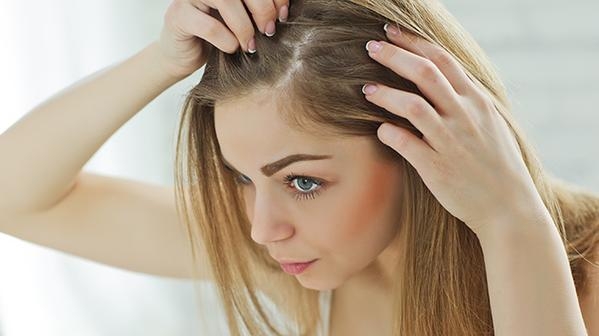Everything you need to know about oily hair

Oily hair is the arch nemesis of hair goals. Greasy hair can throw off your whole appearance, turning your freshly washed hair into a sad and droopy mess, before you even walk out the door! Aside from being an eyesore, greasy hair feels yucky and if left untreated, will only make matters worse. Luckily, with this guide, you’ll learn what causes oily hair, and how to take to your hair from mess to impress.

What Causes Oily Hair?
Excess oil in your hair usually occurs for two reasons: issues in the scalp or poor beauty habits. To get to the root of the problem, you’ll need to understand the science behind hair growth. Every pore on your skin has a sebaceous gland, including your scalp. The sebaceous glands secrete an oily substance called sebum, which gives your hair its natural shine. Sebum keeps your hair healthy and smooth, and it keeps the hair from becoming dry and breaking. However, some sebaceous glands produce an excess of oil, which results in oily skin and greasy hair.
Excessive oil production can occur for several reasons. It can be hereditary or due to hormonal changes (puberty or pregnancy), or even changes in seasons, lifestyle, or climate. Poor diet, improper hair care, and some medicines can also impact how oily your hair is.
How to Prevent Oily Hair
Controlling oily hair is within your own hands… literally. You can help prevent oily hair simply by keeping your hands off of it! This goes for brushing your hair as well, as both further distribute grease throughout your strands.
Greasy hair is also a cyclical problem. Overwashing or excess scrubbing during shampooing can irritate the scalp, causing more oil. Once you strip your hair of its natural oils, your scalp goes into oil production overload. For this reason alone, do NOT wash your hair more than once a day. It’s important to rinse your hair in cold water for a minimum of 30 seconds to ensure that all shampoo and conditioner is out of your hair. Hot water stimulates the sebaceous glands, while cold water helps shut them down. Cool water also helps close your cuticle, reducing damage to your hair.
Let your hair air dry naturally, or keep the heat at a minimum, as often as possible. Similar to hot water, hot air can stimulate oil production faster.
Too much product can also cause buildup on the scalp, leading to excess grease. While you don’t need to stop using styling products altogether if your hair is naturally oily, you just need to know how to choose the right styling products.
How to Manage Oily Hair
Did you know you can actually train your hair to be less greasy? A well-designed care regimen for oily hair begins with a mild shampoo and a careful cleansing routine. A lightweight conditioner can help replenish and balance the moisture on your scalp without sending it into overproduction mode. Many times, a perceived accumulation of oils in hair is actually due to a poor rinse job. If conditioner still seems too much for your hair, try conditioning first and shampooing second to remove extra residue. Another option is to nix your traditional conditioner and opt for leave-in conditioning spray (on your ends only).
Next, space out your washes. An oily scalp is a vicious cycle made worse by attempts at reversing the problem. Ideally, you should be able to go 2-3 days between shampoos to get oil production under control. Be patient, as you won’t get there overnight. In the meantime, you can experiment with dry shampoos and hair powders that are designed to help soak up that oil without stripping your scalp of its natural oils.
You can also try using a clarifying shampoo or treatment twice per month. Despite your best rinsing attempts, your oily hair may be the result of buildup or heavy conditioners. Regardless of the amount of product you use, your hair may be good at holding on to traces of oil.
Finally, remember that you are what you eat, and your intake of B vitamins directly correlates with your level of sebum production. Make sure you’re getting a sufficient amount of the B vitamins (B2 and B6 in particular) to help combat greasy hair.
If these suggestions don’t improve your oily locks, it may be time to contact a doctor to consider other causes. This is especially the case if excess oil is accompanied by dandruff flakes. Seborrheic dermatitis and psoriasis may appear as dandruff at first but will persist despite shampooing.

